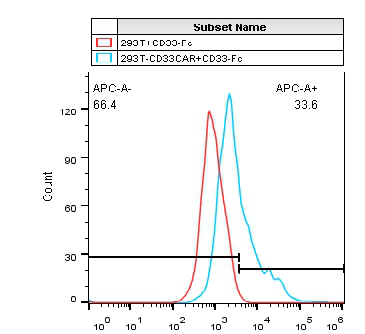Recombinant human CD33 protein
CD33 is a molecular weight of 67kDa in Ⅰ type transmembrane receptor protein, a 364 amino acids. CD33 is widely distributed on the surface of blood, bone marrow and lymphocytes. It belongs to the immunoglobulin superfamily and a member of the sialic acid-dependent immunoglobulin-like lectin (Siglecs) family. It participates in regulating cell growth, differentiation, apoptosis and secretion and release of related factors and other life processes, and plays an important role in cellular immune response. CD33 in 90% of acute myeloid leukemia patients have the above expression. It is not expressed on the surface of hematopoietic stem cells, nor is it expressed on mature granulocytes and other tissues. Therefore, CD33 has become a good target for the treatment of myeloid leukemia. This product is a CD33-FC recombinant protein ( FC tag can be removed by enterokinase), which can be used for monoclonal antibody screening or antibody function verification.
Product name: Recombinant human CD33 protein
Species: Human origin
Gene sequence number: P20138
Tags: Human-Fc Tag
Tag site: N- terminal
Restriction site: enterokinase
Expression area: extracellular segment 65-265AA
Host cell: 293F
Purity: >90%
Purification method: Protein A column
Preservation system: PBS+20% glycerol
Storage conditions: -80℃

The image shows the FACS detection of CD33-Fc protein binding to 293T overexpressing CD33-CAR
Reference materials:
1. Siglecs, sialic acids and innate immunity
2.
Targeting of the CD33-calicheamicin immunoconjugate Mylotarg (CMA-676)
in acute myeloid leukemia : in vivo and in vitro saturation and
internalization by leukemic and normal myeloid cells
3. Alzheimer’s Disease Risk Gene CD33 Inhibits Microglial Uptake of Amyloid Beta

